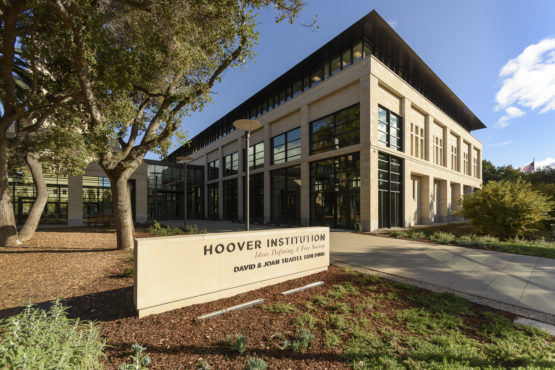Search committee appointed to find next Hoover Institution director
The Hoover Institution bylaws outline the director search process, including the selection of a 10-member search committee. Joshua Rauh will chair the committee.
A search committee has been appointed to seek a successor to Hoover Institution Director Thomas Gilligan, who has announced his intentions to depart the post next year.

The Hoover institution, which recently completed the Traitel Building. has begun the search for a new director. (Image credit: L.A. Cicero)
Gilligan, the Tad and Dianne Taube Director of the Hoover Institution, will have served at the helm for five years, having assumed his role in 2015.
The Hoover Institution bylaws outline the director search process, including the selection of a 10-member search committee. The search committee will be chaired by Joshua Rauh, director of research and senior fellow at Hoover, Ormond Family Professor of Finance at the Graduate School of Business (GSB) and senior fellow at the Stanford Institute for Economic Policy Research (SIEPR). He will be joined by three others from Hoover: Scott Atlas, David and Joan Traitel Senior Fellow; David Brady, Davies Family Senior Fellow, professor of political economics at the GSB and of political science, and senior fellow at SIEPR; and Amy Zegart, Davies Family Senior Fellow and senior fellow at the Freeman Spogli Institute for International Studies.
The Hoover Board of Overseers appoints three of its own members to serve on the search committee, and they have been identified as Susan McCaw, Bob Oster and Joel Peterson. The committee also includes three university members appointed by President Marc Tessier-Lavigne: Jonathan Levin, Philip H. Knight Professor and dean of the GSB; Jenny Martinez, Richard E. Lang Professor and dean of the Law School; and Richard Saller, Kleinheinz Family Professor of European Studies.
“The Hoover Search Committee will begin meeting later this summer and through the fall, with the intention of forwarding nominees to the president in early 2020,” Rauh said.
The Hoover bylaws direct the search committee to forward nominations to the Stanford president, who then recommends a candidate to the 120-member Hoover Board of Overseers for approval, and then to the Board of Directors of the Herbert Hoover Foundation for its approval. After those respective board approvals, the final recommendation is submitted to the Stanford Board of Trustees for the final approval and appointment.
A new director is expected to be in place by the beginning of the 2020-21 academic year.
The Hoover Institution on War, Revolution and Peace, Stanford University, is a public policy research center devoted to the advanced study of economics, politics, history and political economy – both domestic and foreign – as well as international affairs. With its eminent scholars and world-renowned library and archives, the Hoover Institution seeks to improve the human condition by advancing ideas that promote economic opportunity and prosperity and secure and safeguard peace for America and all humanity.
